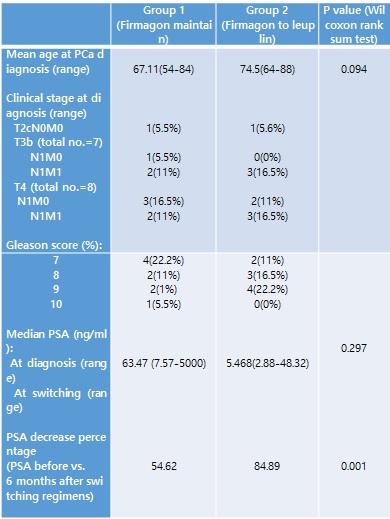|
Cancer - Prostate(구연)
|
(E-150)
|
|
|
Efficacy of a Second Line Luteinizing Hormone-Releasing Hormone Agonist After Biochemical Recurrence of First Line Gonadotropin-releasing hormone antagonist for Advanced Prostate Cancer |
| 가톨릭대학교 의과대학 비뇨기과학교실 |
| 허경재, 문형우, 권혁재, 신동호, 성재우, 박용현, 배웅진, 조혁진,하유신, 이지열, 김세웅, 홍성후 |
Abstract
Purpose: Patients with metastatic prostate cancer have limited treatment options. Androgen deprivation therapy with gonadotropin-releasing hormone (GnRH) analogue is the primary mode of treatment for metastatic prostate cancer. Although GnRH agonists vary in the same class, they show different actions in their pharmacology. We evaluated whether rechallenging patients with prostate cancer, who were receiving a fist-line GnRH antagonist but had biochemical failure, have PSA response after switching to GnRH agonist therapy.
Materials and Methods: We performed a retrospective review of the medical records of patients with prostate cancer at single institutions who received an initial GnRH antagonist (Firmagon, Degarelix®), as measured by consecutive PSA changes. Patients were divided into 2 groups. Group 1 was maintained GnRH antagonist treatment, and group 2 was switched to GnRH agonist after PSA failure. PSA and relevant clinical data, including radiologic studies were evaluated. Statistical analysis was done using Wilcoxon rank sum test, with IBM SPSS® statistics® ver24.
Results: A total of 18 men with advanced prostate cancer were treated with GnRH antagonist initially. Among them, 9 patients (50%) were treated with switching regimen to GnRH agonist due to PSA failure. 8 of 9 patients showed PSA decrease after mean 1.2 months of switching regimen. 1 patient showed disease progression. The mean duration of PSA response was 14.3 months (range 6.8-19.4). PSA decrease percentage in regimen switching group was significantly higher than the group which maintained Firmagon treatment (p< 0.05).
Conclusions: GnRH agonist switching regimen can be an efficient treatment option for patients who showed PSA failure after initial GnRH antagonist therapy in advanced prostate cancer. PSA decreased after switching to GnRH agonist in initially GnRH antagonist treated patients in 88.8%. The mean duration of PSA response was 14.3 months (range 6.8-19.4). The study has limitation by its small numbers and retrospective nature, and furthermore prospective evaluation will be needed.
Keywords: Prostate cancer, Prostate Specific Antigen, Gonadotropin-releasing hormone analogue |
 |
|
keywords : Prostate cancer, Prostate Specific Antigen, Gonadotropin-releasing hormone analogue |
|

